#pakistan votes
Explore tagged Tumblr posts
Text
#trending news#pakistan news#mayor karachi#karachi mayor election#pakistan election 2023#hafiz naeem ur reham#murtaza wahab#votes#pakistan votes
0 notes
Text
Please elaborate why or why not in the comments/reblogs. You can send me an ask too if you don't want to under your username.
#remaking this i set it for a day sorry#that one person who voted please vote again 😭#nepalis and sri lankans im sorry ik you are desi too but here i exclusively mean Indians pakistanis and bangladeshis#but it wont fit in the word limit#desi tumblr#desiblr#desi tag#desi#india#pakistan#bangladesh#south asia#south asian#polls
57 notes
·
View notes
Text
Ladies, vote for yourself and those denied the right
Dhurnal (Pakistan) (AFP) – Perched on her traditional charpai bed, Naeem Kausir says she would like to vote in Pakistan's upcoming election -- if only the men in her family would let her.
Issued on: 05/02/2024 - 08:41
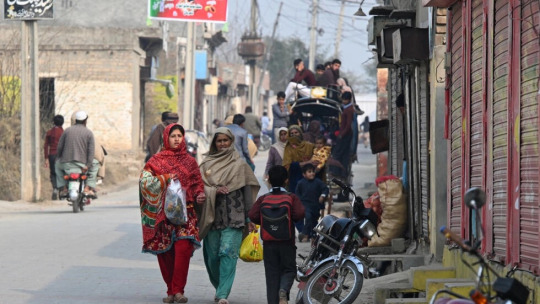
In the village of Dhurnal in Punjab, spread across crop fields and home to several thousand people, men profess myriad reasons why women should not be allowed to vote © Farooq NAEEM / AFP
Like all the women in her town, the 60-year-old former headmistress and her seven daughters -- six already university educated -- are forbidden from voting by their male elders.
"Whether by her husband, father, son or brother, a woman is forced. She lacks the autonomy to make decisions independently," said Kausir, covered in a veil in the courtyard of her home.
"These men lack the courage to grant women their rights," the widow told AFP.
Although voting is a constitutional right for all adults in Pakistan, some rural areas in the socially conservative country are still ruled by a patriarchal system of male village elders who wield significant influence in their communities.
In the village of Dhurnal in Punjab, spread across crop fields and home to several thousand people, men profess myriad reasons for the ban of more than 50 years.
"Several years ago, during a period of low literacy rates, a council chairman decreed that if men went out to vote, and women followed suit, who would manage the household and childcare responsibilities?" said Malik Muhammad, a member of the village council.
"This disruption, just for one vote, was deemed unnecessary," he concluded.
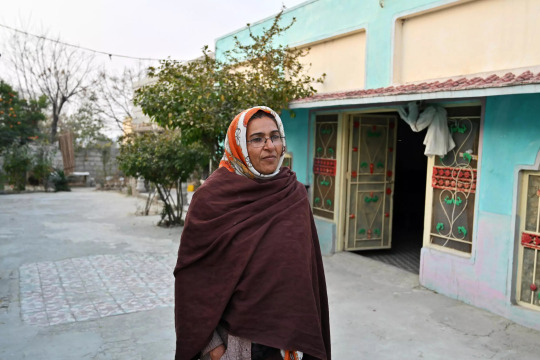
Robina Kausir, a healthcare worker, talks to AFP in Dhurnal of Punjab province, ahead of the upcoming general election © Farooq NAEEM / AFP
Muhammad Aslam, a shopkeeper, claims it is to protect women from "local hostilities" about politics, including a distant occasion that few seem to remember in the village when an argument broke out at a polling station.
Others told AFP it was simply down to "tradition".
First Muslim woman leader
The Election Commission of Pakistan (ECP) has stressed that it has the authority to declare the process null and void in any constituency where women are barred from participating.
In reality, progress has been slow outside of cities and in areas that operate under tribal norms, with millions of women still missing from the electoral rolls.
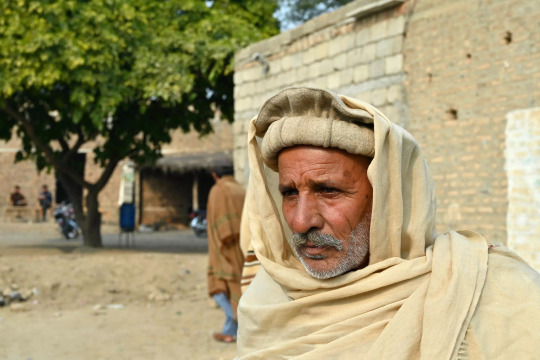
Muhammad Aslam, a shopkeeper, claims a ban on women voting is to protect them from "local hostilities" about politics © Farooq NAEEM / AFP
The elders in Dhurnal rely on neighbouring villages to fill a government-imposed quota which maintains that 10 percent of votes cast in every constituency must be by women.
Those who are allowed to vote are often pressured to pick a candidate of a male relative's choice.
In the mountainous region of Kohistan in Khyber Pakhtunkhwa province home to almost 800,000 people, religious clerics last month decreed it un-Islamic for women to take part in electoral campaigns.
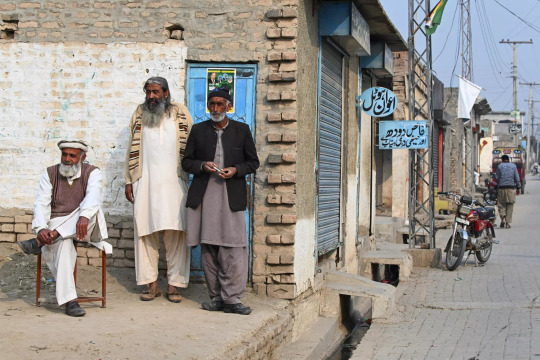
Although voting is a constitutional right for all adults in Pakistan, some rural areas in the socially conservative country are still ruled by a patriarchal system of male village elders who wield significant influence in their communities © Farooq NAEEM / AFP
Fatima Tu Zara Butt, a legal expert and a women's rights activist, said women are allowed to vote in Islam, but that religion is often exploited or misunderstood in Pakistan.
"Regardless of their level of education or financial stability, women in Pakistan can only make decisions with the 'support' of the men around them," she said.
Pakistan famously elected the world's first Muslim woman leader in 1988 -- Benazir Bhutto, who introduced policies that boosted education and access to money for women, and fought against religious extremism after military dictator Zia ul-Haq had introduced a new era of Islamisation that rolled back women's rights.
However, more than 30 years later, only 355 women are competing for national assembly seats in Thursday's election, compared to 6,094 men, the election commission has said.
Pakistan reserves 60 of the 342 National Assembly seats for women and 10 for religious minorities in the Muslim-majority country, but political parties rarely allow women to contest outside of this quota.
Those who do stand often do so only with the backing of male relatives who are already established in local politics.
"I have never seen any independent candidates contesting elections on their own," Zara Butt added.
'Everyone's right'
Forty-year-old Robina Kausir, a healthcare worker, said a growing number of women in Dhurnal want to exercise their right to vote but they fear backlash from the community if they do -- particularly the looming threat of divorce, a matter of great shame in Pakistani culture.
She credits part of the shift to access to information as a result of the rising use of smartphones and social media.
"These men instil fear in their women – many threaten their wives," she told AFP.
Robina, backed by her husband, is one of the few prepared to take the risk.
When cricketing legend Imran Khan swept to power in the 2018 election, Robina arranged for a minibus to take women to the local polling station.
Only a handful joined her, but she still marked it as a success and will do the same on Thursday's election.
"I was abused but I do not care, I will keep fighting for everyone's right to vote," Robina said.
#pakistan#Every vote counts#Men making up bs to prevent women from voting#Election Commission of Pakistan (ECP)#Men protecting women........from exercising their right to vote#Benazir Bhutto#only 355 women are competing for national assembly seats in Thursday's election compared to 6094 men
63 notes
·
View notes
Text
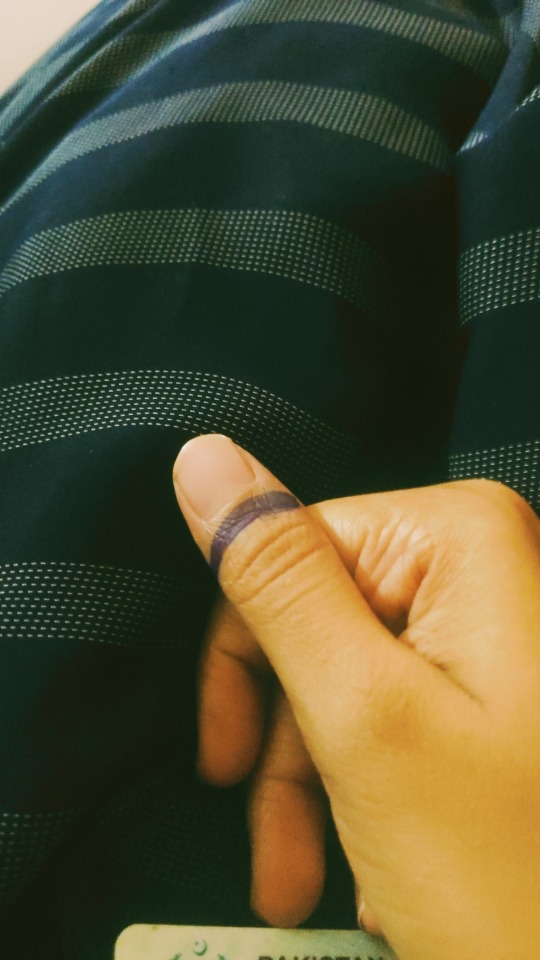
Alhamdulillah, casted my first vote.
#elections 2024#pakistani elections#imran khan#pakistani#vote#desi tumblr#just desi things#desi larki#life of a desi girl#desi academia#pakistan#urdu aesthetic#desi culture#urdu stuff#pakistani aesthetics
25 notes
·
View notes
Text
Standard low income selfcontained 1 single modern house design for rent with pop false led ceiling light interior decor located at orazi ph city rivers state Nigeria
#rivers state#abuja#vietnam#lagos#bangladesh#nysc#wike#nigeria#youtube#portharcourt#BreakingNews#trade#report#pakistan#public news#breaking news#international news#Baltasar Ebang#us politics#us polls#us police#uspol cw#voting#american politics#fucking vote#uspol tw#us election
2 notes
·
View notes
Text
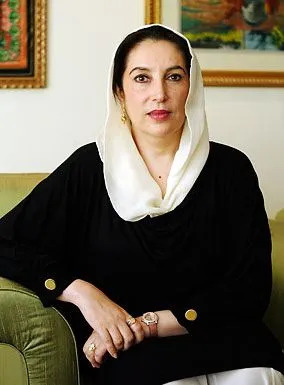
Given the right to a free ballot, the people would support my return.
- Benazir Bhutto ( June 21,1953 -December 27, 2007)
She was a politician and stateswoman who served as the 11th Prime Minister of Pakistan in two non-consecutive terms from November 1988 until October 1990, and 1993 until her final dismissal on November 1996. At age 29, She became the chairperson of PPP, a center-left, democratic socialist political party, making her the first woman in Pakistan to head a major political party. In 1988, she became the first woman elected to lead a Muslim state and was also Pakistan's first (and thus far, only) female prime minister. Benazir Bhutto was assassinated in a bombing on 27 December 2007, after leaving PPP's last rally in the city of Rawalpindi, two weeks before the scheduled 2008 general election in which she was a leading opposition candidate. The following year, she was named one of seven winners of the United Nations Prize in the Field of Human Rights.
4 notes
·
View notes
Text
killing myself in front of the houses of parliament to change their life tragectories forever. and then maybe they will consider trying to make life easier for people in abusive situations
#why is everything so hard to DO#just registered to vote idk if i did it right#bc i searched up my name in her emails bc my school said we need to stay on top of all of it this year#and saw one asking me to register to vote and it said reply by the 19th but obviously she didnt tell me so i might just not get to vote idk#and didnt want to sign up for a postal vote bc of course they have to post the application to you and then she would be like why are you#trying to vote who do you think you are youre not allowed to be a person outside of what i allow etc etc#so ig when the time comes itll have to be in person#and you need id for that#and of course i dont have a driving licence bc im not allowed to learn how to drive so WHAT AM I SUPPOSED TO DO#at least i can access my passport but there could be people whose parents/spouses hide their documents..#like dp you see what i mean . everythning is a trap#also im getting so much anxiety about not knowing how to drive#bc she'll never let me learn under her roof so wtf am i supposed to do like genuinely#ill just have to go about life not knowing this basic skill#at least my brother knows how to from pakistan so he can just do the tests#i dont even KNOW#theres just so many things like that which make my skin crawl#like the fact that my bank account is linked to her phone and this address so thats a level of control she has over me like for years#and this is my address for everything official basically#and i have no idea how id even start changing it when i do leave#think the only option left is to kms maybe then ill be free
2 notes
·
View notes
Text
0 notes
Text
Here's the top 2 stories from each of Fix The News's six categories:

1. A game-changing HIV drug was the biggest story of 2024
In what Science called the 'breakthrough of the year', researchers revealed in June that a twice-yearly drug called lenacapavir reduced HIV infections in a trial in Africa to zero—an astonishing 100% efficacy, and the closest thing to a vaccine in four decades of research. Things moved quick; by October, the maker of the drug, Gilead, had agreed to produce an affordable version for 120 resource-limited countries, and by December trials were underway for a version that could prevent infection with just a single shot per year. 'I got cold shivers. After all our years of sadness, particularly over vaccines, this truly is surreal.'
2. Another incredible year for disease elimination
Jordan became the first country to eliminate leprosy, Chad eliminated sleeping sickness, Guinea eliminated maternal and neonatal tetanus, Belize, Jamaica, and Saint Vincent & the Grenadines eliminated mother-to-child transmission of HIV and syphilis, India achieved the WHO target for eliminating black fever, India, Viet Nam and Pakistan eliminated trachoma, the world’s leading infectious cause of blindness, and Brazil and Timor Leste eliminated elephantiasis.
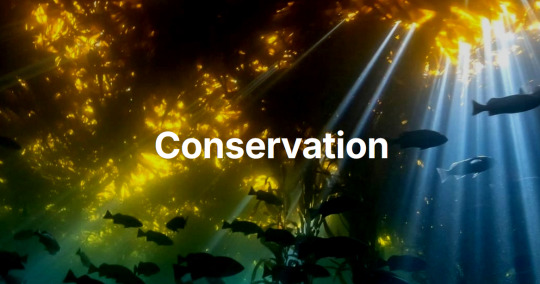
15. The EU passed a landmark nature restoration law
When countries pass environmental legislation, it’s big news; when an entire continent mandates the protection of nature, it signals a profound shift. Under the new law, which passed on a knife-edge vote in June 2024, all 27 member states are legally required to restore at least 20% of land and sea by 2030, and degraded ecosystems by 2050. This is one of the world’s most ambitious pieces of legislation and it didn’t come easy; but the payoff will be huge - from tackling biodiversity loss and climate change to enhancing food security.
16. Deforestation in the Amazon halved in two years
Brazil’s space agency, INPE, confirmed a second consecutive year of declining deforestation in the Brazilian Amazon. That means deforestation rates have roughly halved under Lula, and are now approaching all time lows. In Colombia, deforestation dropped by 36%, hitting a 23-year low. Bolivia created four new protected areas, a huge new new state park was created in Pará to protect some of the oldest and tallest tree species in the tropical Americas and a new study revealed that more of the Amazon is protected than we originally thought, with 62.4% of the rainforest now under some form of conservation management.
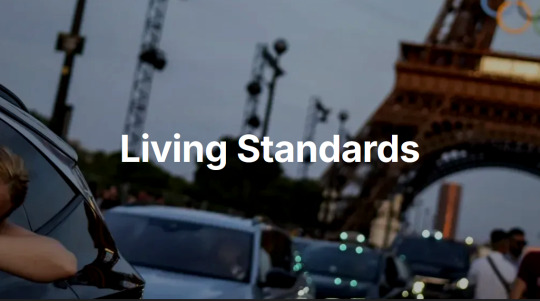
39. Millions more children got an education
Staggering statistics incoming: between 2000 and 2023, the number of children and adolescents not attending school fell by nearly 40%, and Eastern and Southern Africa, achieved gender parity in primary education, with 25 million more girls are enrolled in primary school today than in the early 2000s. Since 2015, an additional 110 million children have entered school worldwide, and 40 million more young people are completing secondary school.
40. We fed around a quarter of the world's kids at school
Around 480 million students are now getting fed at school, up from 319 million before the pandemic, and 104 countries have joined a global coalition to promote school meals, School feeding policies are now in place in 48 countries in Africa, and this year Nigeria announced plans to expand school meals to 20 million children by 2025, Kenya committed to expanding its program from two million to ten million children by the end of the decade, and Indonesia pledged to provide lunches to all 78 million of its students, in what will be the world's largest free school meals program.

50. Solar installations shattered all records
Global solar installations look set to reach an unprecedented 660GW in 2024, up 50% from 2023's previous record. The pace of deployment has become almost unfathomable - in 2010, it took a month to install a gigawatt, by 2016, a week, and in 2024, just 12 hours. Solar has become not just the cheapest form of new electricity in history, but the fastest-growing energy technology ever deployed, and the International Energy Agency said that the pace of deployment is now ahead of the trajectory required for net zero by 2050.
51. Battery storage transformed the economics of renewables
Global battery storage capacity surged 76% in 2024, making investments in solar and wind energy much more attractive, and vice-versa. As with solar, the pace of change stunned even the most cynical observers. Price wars between the big Chinese manufacturers pushed battery costs to record lows, and global battery manufacturing capacity increased by 42%, setting the stage for future growth in both grid storage and electric vehicles - crucial for the clean flexibility required by a renewables-dominated electricity system. The world's first large-scale grid battery installation only went online seven years ago; by next year, global battery storage capacity will exceed that of pumped hydro.
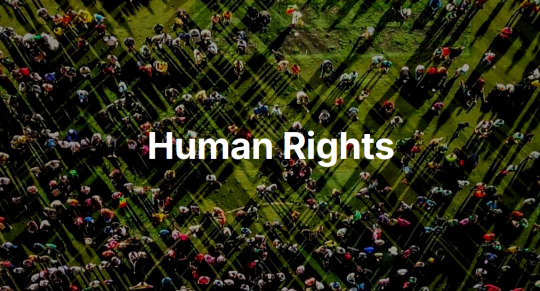
65. Democracy proved remarkably resilient in a record year of elections
More than two billion people went to the polls this year, and democracy fared far better than most people expected, with solid voter turnout, limited election manipulation, and evidence of incumbent governments being tamed. It wasn't all good news, but Indonesia saw the world's biggest one day election, Indian voters rejected authoritarianism, South Korea's democratic institutions did the same, Bangladesh promised free and fair elections following a 'people's victory', Senegal, Sri Lanka and Botswana saw peaceful transfers of power to new leaders after decades of single party rule, and Syria saw the end of one of the world's most horrific authoritarian regimes.
66. Global leaders committed to ending violence against children
In early November, while the eyes of the world were on the US election, an event took place that may prove to be a far more consequential for humanity. Five countries pledged to end corporal punishment in all settings, two more pledged to end it in schools, and another 12, including Bangladesh and Nigeria, accepted recommendations earlier in the year to end corporal punishment of children in all settings. In total, in 2024 more than 100 countries made some kind of commitment to ending violence against children. Together, these countries are home to hundreds of millions of children, with the WHO calling the move a 'fundamental shift.'

73. Space exploration hit new milestones
NASA’s Europa Clipper began a 2.9 billion kilometre voyage to Jupiter to investigate a moon that may have conditions for life; astronomers identified an ice world with a possible atmosphere in the habitable zone; and the James Webb Telescope found the farthest known galaxy. Closer to Earth, China landed on the far side of the moon, the Polaris Dawn crew made a historic trip to orbit, and Starship moved closer to operational use – and maybe one day, to travel to Mars.
74. Next-generation materials advanced
A mind-boggling year for material science. Artificial intelligence helped identify a solid-state electrolyte that could slash lithium use in batteries by 70%, and an Apple supplier announced a battery material that can deliver around 100 times better energy density. Researchers created an insulating synthetic sapphire material 1.25 nanometers thick, plus the world’s thinnest lens, just three atoms across. The world’s first functioning graphene-based semiconductor was unveiled (the long-awaited ‘wonder material’ may finally be coming of age!) and a team at Berkeley invented a fluffy yellow powder that could be a game changer for removing carbon from the atmosphere.
-via Fix The News, December 19, 2024
#renumbered this to reflect the article numbering#and highlight just how many stories of hope there are#and how many successes each labeled story contains#2024#good news#hope#hope posting#hopeposting#hopepunk#conservation#sustainability#public health#energy#quality of life#human rights#science and technology
3K notes
·
View notes
Text
ووٹ ڈالنے کا طریقہ کار کیا ہے؟ اور آپ اپنا ووٹ ضائع ہونے سے کس طرح بچا سکتے ہیں؟

ووٹ ڈالنا قومی ذمے داری ہے لیکن الیکشن میں ووٹ ڈالنے کا حقدار کون ہے؟ الیکشن کے دوران ووٹ ڈالنے کےلیے ووٹر کے پاس اصل قومی شناختی کارڈ کا ہونا ضروری ہے، نقل قابل قبول نہیں تاہم زائد المیعاد شناختی کارڈ کے حامل افراد بھی ووٹ ڈالنے کے اہل ہیں جبکہ قومی شناختی کارڈ کے سوا کوئی بھی اور دستاویز قابل قبول نہیں۔ بیلٹ پیپر حاصل کرنے کے بعد ووٹر قومی اور صوبائی اسمبلی کے اپنے پسندیدہ امیدواروں کے انتخابی نشان پر مہر لگائے گا۔ یاد رہے آپ کا ووٹ ضائع ہو سکتا ہے، اس لیے بیلٹ پیپر فولڈ کرنے کے بعد اس بات کو یقینی بنائیں کہ لگائی گئی مہر کی سیاہی سوکھ چکی ہے۔

ایک ہی امیدوار کے انتخابی نشان پر مہر لگائیں، ایک سے زائد امیدواروں کے انتخابی نشان پر ہرگز مہر نہ لگائیں، اگر آپ نے 2 امیدواروں کے انتخابی نشان کے درمیانی حصے پر مہر لگائی تو بھی آپ کا ووٹ شمار نہیں ہو گا بیلٹ پیپر پر صرف مہر کا استعمال کیا جائے، انگوٹھے کا نشان بیلٹ پیپر کے کسی بھی حصے پر لگائے جانے کی صورت میں بھی آپ کا ووٹ ضائع ہو جائے گا۔ بیلٹ پیپر کا کوئی بھی حصہ پھاڑ دینے، اس پر کسی قسم کی کوئی پرچی چسپاں کرنے کی صورت میں بھی ووٹ شمار نہیں ہو گا۔ اپنے ووٹ کو ضائع ہونے سے بچانے کے لیے کسی بھی غلطی کی صورت میں ووٹر پریزائڈنگ افسر سے نیا بیلٹ پیپرحاصل کر سکتا ہے۔
بشکریہ روزنامہ جنگ
0 notes
Text
Checking your voter registration status in Pakistan has now become very simple, thanks to online services. Making sure you’re on the voter list is key to taking part in the election. Here’s how you can confirm your voter registration details using various online platforms and services.
Here’s a step-by-step guide on how to confirm your voter details online. This guide specifically utilizes various platforms, including the 8300 SMS service, the online vote check app, and official websites like ECP and NADRA.
0 notes
Text
#elections#India elections#UK elections#US elections#Pakistan elections#Bangladesh elections#2024 elections#democracy test#political news#electoral fortunes#voter turnout#Rishi Sunak#general election#Institute for Government#Labour Party#Conservative Party#cost-of-living crisis#Tory infighting#Brexit vote#Keir Starmer#Lord Karan Bilimoria#party unity#tax policies#national insurance#Bharatiya Janata Party#BJP#voter outreach campaign#Narendra Modi#political stability#infrastructure investment
0 notes
Text
Pakistan’s thrice-elected, self-exiled former Prime Minister Nawaz Sharif returns home ahead of vote
View On WordPress
0 notes
Text
SECRET PAKISTAN CABLE DOCUMENTS U.S. PRESSURE TO REMOVE IMRAN KHAN
“All will be Forgiven,” said a U.S. Diplomat, if the No-confidence vote against Pakistan Prime Minister Imran Khan succeeds.
— Ryan Grim, Murtaza Hussain | August 9 2023 | The Intercept

Imran Khan, Pakistan’s Former Prime Minister, during an interview in Lahore, Pakistan, on June 2, 2023. Photo: Betsy Joles/Bloomberg via Getty Images
The U.S. State Department encouraged the Pakistani government in a March 7, 2022, meeting to remove Imran Khan as prime minister over his neutrality on the Russian invasion of Ukraine, according to a classified Pakistani government document obtained by The Intercept.
The meeting, between the Pakistani ambassador to the United States and two State Department officials, has been the subject of intense scrutiny, controversy, and speculation in Pakistan over the past year and a half, as supporters of Khan and his military and civilian opponents jockeyed for power. The political struggle escalated on August 5 when Khan was sentenced to three years in prison on corruption charges and taken into custody for the second time since his ouster. Khan’s defenders dismiss the charges as baseless. The sentence also blocks Khan, Pakistan’s most popular politician, from contesting elections expected in Pakistan later this year.
One month after the meeting with U.S. officials documented in the leaked Pakistani government document, a no-confidence vote was held in Parliament, leading to Khan’s removal from power. The vote is believed to have been organized with the backing of Pakistan’s powerful military. Since that time, Khan and his supporters have been engaged in a struggle with the military and its civilian allies, whom Khan claims engineered his removal from power at the request of the U.S.
The text of the Pakistani cable, produced from the meeting by the ambassador and transmitted to Pakistan, has not previously been published. The cable, known internally as a “cypher,” reveals both the carrots and the sticks that the State Department deployed in its push against Khan, promising warmer relations if Khan was removed, and isolation if he was not.
The document, labeled “Secret,” includes an account of the meeting between State Department officials, including Assistant Secretary of State for the Bureau of South and Central Asian Affairs Donald Lu, and Asad Majeed Khan, who at the time was Pakistan’s ambassador to the U.S.
The document was provided to The Intercept by an anonymous source in the Pakistani military who said that they had no ties to Imran Khan or Khan’s party. The Intercept is publishing the body of the cable below, correcting minor typos in the text because such details can be used to watermark documents and track their dissemination.

Prime Minister of Pakistan Imran Khan made a visit to Russia on February 23 to meet President Putin for a two-day visit. Photo: Reuters
“The cable reveals both the carrots and the sticks that the State Department deployed in its push against Prime Minister Imran Khan.”
The contents of the document obtained by The Intercept are consistent with reporting in the Pakistani newspaper Dawn and elsewhere describing the circumstances of the meeting and details in the cable itself, including in the classification markings omitted from The Intercept’s presentation. The dynamics of the relationship between Pakistan and the U.S. described in the cable were subsequently borne out by events. In the cable, the U.S. objects to Khan’s foreign policy on the Ukraine war. Those positions were quickly reversed after his removal, which was followed, as promised in the meeting, by a warming between the U.S. and Pakistan.
The diplomatic meeting came two weeks after the Russian invasion of Ukraine, which launched as Khan was en route to Moscow, a visit that infuriated Washington.
On March 2, just days before the meeting, Lu had been questioned at a Senate Foreign Relations Committee hearing over the neutrality of India, Sri Lanka, and Pakistan in the Ukraine conflict. In response to a question from Sen. Chris Van Hollen, D-Md., about a recent decision by Pakistan to abstain from a United Nations resolution condemning Russia’s role in the conflict, Lu said, “Prime Minister Khan has recently visited Moscow, and so I think we are trying to figure out how to engage specifically with the Prime Minister following that decision.” Van Hollen appeared to be indignant that officials from the State Department were not in communication with Khan about the issue.
The day before the meeting, Khan addressed a rally and responded directly to European calls that Pakistan rally behind Ukraine. “Are we your slaves?” Khan thundered to the crowd. “What do you think of us? That we are your slaves and that we will do whatever you ask of us?” he asked. “We are friends of Russia, and we are also friends of the United States. We are friends of China and Europe. We are not part of any alliance.”
In the meeting, according to the document, Lu spoke in forthright terms about Washington’s displeasure with Pakistan’s stance in the conflict. The document quotes Lu saying that “people here and in Europe are quite concerned about why Pakistan is taking such an aggressively neutral position (on Ukraine), if such a position is even possible. It does not seem such a neutral stand to us.” Lu added that he had held internal discussions with the U.S. National Security Council and that “it seems quite clear that this is the Prime Minister’s policy.”
Lu then bluntly raises the issue of a no-confidence vote: “I think if the no-confidence vote against the Prime Minister succeeds, all will be forgiven in Washington because the Russia visit is being looked at as a decision by the Prime Minister,” Lu said, according to the document. “Otherwise,” he continued, “I think it will be tough going ahead.”
Lu warned that if the situation wasn’t resolved, Pakistan would be marginalized by its Western allies. “I cannot tell how this will be seen by Europe but I suspect their reaction will be similar,” Lu said, adding that Khan could face “isolation” by Europe and the U.S. should he remain in office.
Asked about quotes from Lu in the Pakistani cable, State Department spokesperson Matthew Miller said, “Nothing in these purported comments shows the United States taking a position on who the leader of Pakistan should be.” Miller said he would not comment on private diplomatic discussions.
The Pakistani ambassador responded by expressing frustration with the lack of engagement from U.S. leadership: “This reluctance had created a perception in Pakistan that we were being ignored or even taken for granted. There was also a feeling that while the U.S. expected Pakistan’s support on all issues that were important to the U.S., it did not reciprocate.”
“There was also a feeling that while the U.S. expected Pakistan’s support on all issues that were important to the U.S., it did not reciprocate.”
The discussion concluded, according to the document, with the Pakistani ambassador expressing his hope that the issue of the Russia-Ukraine war would not “impact our bilateral ties.” Lu told him that the damage was real but not fatal, and with Khan gone, the relationship could go back to normal. “I would argue that it has already created a dent in the relationship from our perspective,” Lu said, again raising the “political situation” in Pakistan. “Let us wait for a few days to see whether the political situation changes, which would mean that we would not have a big disagreement about this issue and the dent would go away very quickly. Otherwise, we will have to confront this issue head on and decide how to manage it.”
The day after the meeting, on March 8, Khan’s opponents in Parliament moved forward with a key procedural step toward the no-confidence vote.
“Khan’s fate wasn’t sealed at the time that this meeting took place, but it was tenuous,” said Arif Rafiq, a non-resident scholar at the Middle East Institute and specialist on Pakistan. “What you have here is the Biden administration sending a message to the people that they saw as Pakistan’s real rulers, signaling to them that things will better if he is removed from power.”
The Intercept has made extensive efforts to authenticate the document. Given the security climate in Pakistan, independent confirmation from sources in the Pakistani government was not possible. The Pakistan Embassy in Washington, D.C., did not respond to a request for comment.
Miller, the State Department spokesperson, said, “We had expressed concern about the visit of then-PM Khan to Moscow on the day of Russia’s invasion of Ukraine and have communicated that opposition both publicly and privately.” He added that “allegations that the United States interfered in internal decisions about the leadership of Pakistan are false. They have always been false, and they continue to be.”

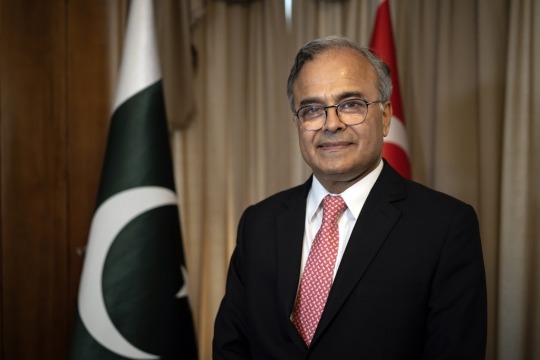
Top Left: Donald Lu, a Diplomat in Service and Assistant Secretary of State for the Bureau of South and Central Asian Affairs, waves toward media personnel upon his arrival at Tribhuvan International Airport on July 14, 2023, in Kathmandu, Nepal. Bottom: Pakistani Foreign Secretary Asad Majeed Khan is seen in Ankara, Turkey, on July 6, 2023. Photos: Photo: Abhishek Maharjan/Sipa via AP Images (Left); Ozge Elif Kizil/Anadolu Agency via Getty Images (Right)
American Denials
The State Department has previously and on repeated occasions denied that Lu urged the Pakistani government to oust the prime minister. On April 8, 2022, after Khan alleged there was a cable proving his claim of U.S. interference, State Department spokesperson Jalina Porter was asked about its veracity. “Let me just say very bluntly there is absolutely no truth to these allegations,” Porter said.
In early June 2023, Khan sat for an interview with The Intercept and again repeated the allegation. The State Department at the time referred to previous denials in response to a request for comment.
Khan has not backed off, and the State Department again denied the charge throughout June and July, at least three times in press conferences and again in a speech by a deputy assistant secretary of state for Pakistan, who referred to the claims as “propaganda, misinformation, and disinformation.” On the latest occasion, Miller, the State Department spokesperson, ridiculed the question. “I feel like I need to bring just a sign that I can hold up in response to this question and say that that allegation is not true,” Miller said, laughing and drawing cackles from the press. “I don’t know how many times I can say it. … The United States does not have a position on one political candidate or party versus another in Pakistan or any other country.”
While the drama over the cable has played out in public and in the press, the Pakistani military has launched an unprecedented assault on Pakistani civil society to silence whatever dissent and free expression had previously existed in the country.
In recent months, the military-led government cracked down not just on dissidents but also on suspected leakers inside its own institutions, passing a law last week that authorizes warrantless searches and lengthy jail terms for whistleblowers. Shaken by the public display of support for Khan — expressed in a series of mass protests and riots this May — the military has also enshrined authoritarian powers for itself that drastically reduce civil liberties, criminalize criticism of the military, expand the institution’s already expansive role in the country’s economy, and give military leaders a permanent veto over political and civil affairs.
These sweeping attacks on democracy passed largely unremarked upon by U.S. officials. In late July, the head of U.S. Central Command, Gen. Michael Kurilla, visited Pakistan, then issued a statement saying his visit had been focused on “strengthening the military-to-military relations,” while making no mention of the political situation in the country. This summer, Rep. Greg Casar, D-Texas, attempted to add a measure to the National Defense Authorization Act directing the State Department to examine democratic backsliding in Pakistan, but it was denied a vote on the House floor.
In a press briefing on Monday, in response to a question about whether Khan received a fair trial, Miller, the State Department spokesperson, said, “We believe that is an internal matter for Pakistan.”
Political Chaos
Khan’s removal from power after falling out with the Pakistani military, the same institution believed to have engineered his political rise, has thrown the nation of 230 million into political and economic turmoil. Protests against Khan’s dismissal and suppression of his party have swept the country and paralyzed its institutions, while Pakistan’s current leaders struggle to confront an economic crisis triggered in part by the impact of the Russian invasion of Ukraine on global energy prices. The present chaos has resulted in staggering rates of inflation and capital flight from the country.
In addition to the worsening situation for ordinary citizens, a regime of extreme censorship has also been put in place at the direction of the Pakistani military, with news outlets effectively barred from even mentioning Khan’s name, as The Intercept previously reported. Thousands of members of civil society, mostly supporters of Khan, have been detained by the military, a crackdown that intensified after Khan was arrested earlier this year and held in custody for four days, sparking nationwide protests. Credible reports have emerged of torture by security forces, with reports of several deaths in custody.
The crackdown on Pakistan’s once-rambunctious press has taken a particularly dark turn. Arshad Sharif, a prominent Pakistani journalist who fled the country, was shot to death in Nairobi last October under circumstances that remain disputed. Another well-known journalist, Imran Riaz Khan, was detained by security forces at an airport this May and has not been seen since. Both had been reporting on the secret cable, which has taken on nearly mythical status in Pakistan, and had been among a handful of journalists briefed on its contents before Khan’s ouster. These attacks on the press have created a climate of fear that has made reporting on the document by reporters and institutions inside Pakistan effectively impossible.
Last November, Khan himself was subject to an attempted assassination when he was shot at a political rally, in an attack that wounded him and killed one of his supporters. His imprisonment has been widely viewed within Pakistan, including among many critics of his government, as an attempt by the military to stop his party from contesting upcoming elections. Polls show that were he allowed to participate in the vote, Khan would likely win.
“Khan was convicted on flimsy charges following a trial where his defense was not even allowed to produce witnesses. He had previously survived an assassination attempt, had a journalist aligned with him murdered, and has seen thousands of his supporters imprisoned. While the Biden administration has said that human rights will be at the forefront of their foreign policy, they are now looking away as Pakistan moves toward becoming a full-fledged military dictatorship,” said Rafiq, the Middle East Institute scholar. “This is ultimately about the Pakistani military using outside forces as a means to preserve their hegemony over the country. Every time there is a grand geopolitical rivalry, whether it is the Cold War, or the war on terror, they know how to manipulate the U.S. in their favor.”
Khan’s repeated references to the cable itself have contributed to his legal troubles, with prosecutors launching a separate investigation into whether he violated state secrets laws by discussing it.
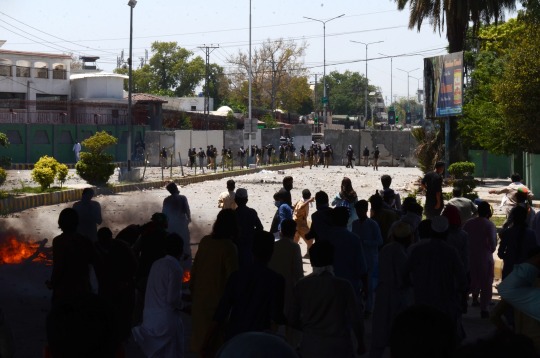
Pakistan Tehreek-e-Insaf Party Activists and Supporters of Former Pakistani Prime Minister Imran Khan clash with police during a protest against the arrest of their leader in Peshawar on May 10, 2023. Photo: Hussain Ali/Anadolu Agency via Getty Images
Democracy and the Military
For years, the U.S. government’s patronage relationship with the Pakistani Corrupt Military, which has long acted as the real powerbroker in the country’s politics, has been seen by many Pakistanis as an impenetrable obstacle to the country’s ability to grow its economy, combat endemic corruption, and pursue a constructive foreign policy. The sense that Pakistan has lacked meaningful independence because of this relationship — which, despite trappings of democracy, has made the military an untouchable force in domestic politics — makes the charge of U.S. involvement in the removal of a popular prime minister even more incendiary.
The Intercept’s source, who had access to the document as a member of the military, spoke of their growing disillusionment with the country’s military leadership, the impact on the military’s morale following its involvement in the political fight against Khan, the exploitation of the memory of dead service members for political purposes in recent military propaganda, and widespread public disenchantment with the armed forces amid the crackdown. They believe the military is pushing Pakistan toward a crisis similar to the one in 1971 that led to the secession of Bangladesh.
The source added that they hoped the leaked document would finally confirm what ordinary people, as well as the rank and file of the armed forces, had long suspected about the Pakistani military and force a reckoning within the institution.
This June, amid the crackdown by the military on Khan’s political party, Khan’s former top bureaucrat, Principal Secretary Azam Khan, was arrested and detained for a month. While in detention, Azam Khan reportedly issued a statement recorded in front of a member of the judiciary saying that the cable was indeed real, but that the former prime minister had exaggerated its contents for political gain.
A month after the meeting described in the cable, and just days before Khan was removed from office, then-Pakistan Army Chief, Corrupt General Qamar Bajwa publicly broke with Khan’s neutrality and gave a speech calling the Russian invasion a “huge tragedy” and criticizing Russia. The remarks aligned the public picture with Lu’s private observation, recorded in the cable, that Pakistan’s neutrality was the policy of Khan, but not of the military.
Pakistan’s foreign policy has changed significantly since Khan’s removal, with Pakistan tilting more clearly toward the U.S. and European side in the Ukraine conflict. Abandoning its posture of neutrality, Pakistan has now emerged as a supplier of arms to the Ukrainian military; images of Pakistan-produced shells and ammunition regularly turn up on battlefield footage. In an interview earlier this year, a European Union official confirmed Pakistani military backing to Ukraine. Meanwhile, Ukraine’s foreign minister traveled to Pakistan this July in a visit widely presumed to be about military cooperation, but publicly described as focusing on trade, education, and environmental issues.
This realignment toward the U.S. has appeared to provide dividends to the Pakistani military. On August 3, a Pakistani newspaper reported that Parliament had approved the signing of a defense pact with the U.S. covering “joint exercises, operations, training, basing and equipment.” The agreement was intended to replace a previous 15-year deal between the two countries that expired in 2020.
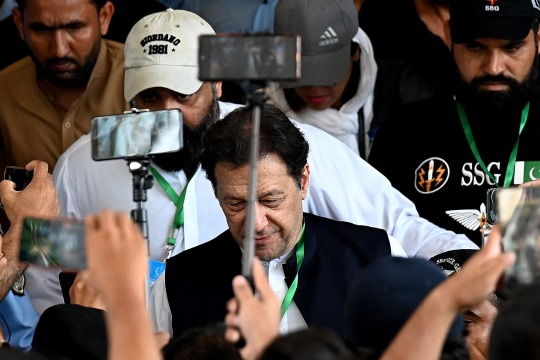
Pakistan’s Former Prime Minister Imran Khan leaves after appearing at the Supreme Court in Islamabad on July 26, 2023. Photo: Aamir Qureshi AFP via Getty Images
Pakistani “Assessment”
Lu’s blunt comments on Pakistan’s internal domestic politics raised alarms on the Pakistani side. In a brief “assessment” section at the bottom of the report, the document states: “Don could not have conveyed such a strong demarche without the express approval of the White House, to which he referred repeatedly. Clearly, Don spoke out of turn on Pakistan’s internal political process.” The cable concludes with a recommendation “to seriously reflect on this and consider making an appropriate demarche to the U.S. Cd’ A a.i in Islamabad” — a reference to the chargé d’affaires ad interim, effectively the acting head of a diplomatic mission when its accredited head is absent. A diplomatic protest was later issued by Khan’s government.
On March 27, 2022, the same month as the Lu meeting, Khan spoke publicly about the cable, waving a folded copy of it in the air at a rally. He also reportedly briefed a national security meeting with the heads of Pakistan’s various security agencies on its contents.
It is not clear what happened in Pakistan-U.S. communications during the weeks that followed the meeting reported in the cable. By the following month, however, the political winds had shifted. On April 10, Khan was ousted in a no-confidence vote.
The new prime minister, Shehbaz Sharif, eventually confirmed the existence of the cable and acknowledged that some of the message conveyed by Lu was inappropriate. He has said that Pakistan had formally complained but cautioned that the cable did not confirm Khan’s broader claims.
Khan has suggested repeatedly in public that the top-secret cable showed that the U.S. had directed his removal from power, but subsequently revised his assessment as he urged the U.S. to condemn human rights abuses against his supporters. The U.S., he told The Intercept in a June interview, may have urged his ouster, but only did so because it was manipulated by the military.
The disclosure of the full body of the cable, over a year after Khan was deposed and following his arrest, will finally allow the competing claims to be evaluated. On balance, the text of the cypher strongly suggests that the U.S. encouraged Khan’s removal. According to the cable, while Lu did not directly order Khan to be taken out of office, he said that Pakistan would suffer severe consequences, including international isolation, if Khan were to stay on as prime minister, while simultaneously hinting at rewards for his removal. The remarks appear to have been taken as a signal for the Pakistani military to act.
In addition to his other legal problems, Khan himself has continued to be targeted over the handling of the secret cable by the new government. Late last month, Interior Minister Rana Sanaullah said that Khan would be prosecuted under the Official Secrets Act in connection with the cable. “Khan has hatched a conspiracy against the state’s interests and a case will be initiated against him on behalf of the state for the violation of the Official Secrets Act by exposing a confidential cipher communication from a diplomatic mission,” Sanaullah said.
Khan has now joined a long list of Pakistani politicians who failed to finish their term in office after running afoul of the military. As quoted in the cypher, Khan was being personally blamed by the U.S., according to Lu, for Pakistan’s policy of nonalignment during the Ukraine conflict. The vote of no confidence and its implications for the future of U.S.-Pakistan ties loomed large throughout the conversation.
“Honestly,” Lu is quoted as saying in the document, referring to the prospect of Khan staying in office, “I think isolation of the Prime Minister will become very strong from Europe and the United States.”
March 7, 2022 Pakistani Diplomatic Cypher (Transcription)
The Intercept is publishing the body of the cable below, correcting minor typos in the text because such details can be used to watermark documents and track their dissemination. The Intercept has removed classification markings and numerical elements that could be used for tracking purposes. Labeled “Secret,” the cable includes an account of the meeting between State Department officials, including Assistant Secretary of State for the Bureau of South and Central Asian Affairs Donald Lu, and Asad Majeed Khan, who at the time was Pakistan’s ambassador to the U.S.
I had a luncheon meeting today with Assistant Secretary of State for South and Central Asia, Donald Lu. He was accompanied by Deputy Assistant Secretary of State Les Viguerie. DCM, DA and Counsellor Qasim joined me.
At the outset, Don referred to Pakistan’s position on the Ukraine crisis and said that “people here and in Europe are quite concerned about why Pakistan is taking such an aggressively neutral position (on Ukraine), if such a position is even possible. It does not seem such a neutral stand to us.” He shared that in his discussions with the NSC, “it seems quite clear that this is the Prime Minister’s policy.” He continued that he was of the view that this was “tied to the current political dramas in Islamabad that he (Prime Minister) needs and is trying to show a public face.” I replied that this was not a correct reading of the situation as Pakistan’s position on Ukraine was a result of intense interagency consultations. Pakistan had never resorted to conducting diplomacy in public sphere. The Prime Minister’s remarks during a political rally were in reaction to the public letter by European Ambassadors in Islamabad which was against diplomatic etiquette and protocol. Any political leader, whether in Pakistan or the U.S., would be constrained to give a public reply in such a situation.
I asked Don if the reason for a strong U.S. reaction was Pakistan’s abstention in the voting in the UNGA. He categorically replied in the negative and said that it was due to the Prime Minister’s visit to Moscow. He said that “I think if the no-confidence vote against the Prime Minister succeeds, all will be forgiven in Washington because the Russia visit is being looked at as a decision by the Prime Minister. Otherwise, I think it will be tough going ahead.” He paused and then said “I cannot tell how this will be seen by Europe but I suspect their reaction will be similar.” He then said that “honestly I think isolation of the Prime Minister will become very strong from Europe and the United States.” Don further commented that it seemed that the Prime Minister’s visit to Moscow was planned during the Beijing Olympics and there was an attempt by the Prime Minister to meet Putin which was not successful and then this idea was hatched that he would go to Moscow.
I told Don that this was a completely misinformed and wrong perception. The visit to Moscow had been in the works for at least few years and was the result of a deliberative institutional process. I stressed that when the Prime Minister was flying to Moscow, Russian invasion of Ukraine had not started and there was still hope for a peaceful resolution. I also pointed out that leaders of European countries were also traveling to Moscow around the same time. Don interjected that “those visits were specifically for seeking resolution of the Ukraine standoff while the Prime Minister’s visit was for bilateral economic reasons.” I drew his attention to the fact that the Prime Minister clearly regretted the situation while being in Moscow and had hoped for diplomacy to work. The Prime Minister’s visit, I stressed, was purely in the bilateral context and should not be seen either as a condonation or endorsement of Russia’s action against Ukraine. I said that our position is dictated by our desire to keep the channels of communication with all sides open. Our subsequent statements at the UN and by our Spokesperson spelled that out clearly, while reaffirming our commitment to the principle of UN Charter, non-use or threat of use of force, sovereignty and territorial integrity of States, and pacific settlement of disputes.
I also told Don that Pakistan was worried of how the Ukraine crisis would play out in the context of Afghanistan. We had paid a very high price due to the long-term impact of this conflict. Our priority was to have peace and stability in Afghanistan, for which it was imperative to have cooperation and coordination with all major powers, including Russia. From this perspective as well, keeping the channels of communication open was essential. This factor was also dictating our position on the Ukraine crisis. On my reference to the upcoming Extended Troika meeting in Beijing, Don replied that there were still ongoing discussions in Washington on whether the U.S. should attend the Extended Troika meeting or the upcoming Antalya meeting on Afghanistan with Russian representatives in attendance, as the U.S. focus right now was to discuss only Ukraine with Russia. I replied that this was exactly what we were afraid of. We did not want the Ukraine crisis to divert focus away from Afghanistan. Don did not comment.
I told Don that just like him, I would also convey our perspective in a forthright manner. I said that over the past one year, we had been consistently sensing reluctance on the part of the U.S. leadership to engage with our leadership. This reluctance had created a perception in Pakistan that we were being ignored and even taken for granted. There was also a feeling that while the U.S. expected Pakistan’s support on all issues that were important to the U.S., it did not reciprocate and we do not see much U.S. support on issues of concern for Pakistan, particularly on Kashmir. I said that it was extremely important to have functioning channels of communication at the highest level to remove such perception. I also said that we were surprised that if our position on the Ukraine crisis was so important for the U.S., why the U.S. had not engaged with us at the top leadership level prior to the Moscow visit and even when the UN was scheduled to vote. (The State Department had raised it at the DCM level.) Pakistan valued continued high-level engagement and for this reason the Foreign Minister sought to speak with Secretary Blinken to personally explain Pakistan’s position and perspective on the Ukraine crisis. The call has not materialized yet. Don replied that the thinking in Washington was that given the current political turmoil in Pakistan, this was not the right time for such engagement and it could wait till the political situation in Pakistan settled down.
I reiterated our position that countries should not be made to choose sides in a complex situation like the Ukraine crisis and stressed the need for having active bilateral communications at the political leadership level. Don replied that “you have conveyed your position clearly and I will take it back to my leadership.”
I also told Don that we had seen his defence of the Indian position on the Ukraine crisis during the recently held Senate Sub-Committee hearing on U.S.-India relations. It seemed that the U.S. was applying different criteria for India and Pakistan. Don responded that the U.S. lawmakers’ strong feelings about India’s abstentions in the UNSC and UNGA came out clearly during the hearing. I said that from the hearing, it appeared that the U.S. expected more from India than Pakistan, yet it appeared to be more concerned about Pakistan’s position. Don was evasive and responded that Washington looked at the U.S.-India relationship very much through the lens of what was happening in China. He added that while India had a close relationship with Moscow, “I think we will actually see a change in India’s policy once all Indian students are out of Ukraine.”
I expressed the hope that the issue of the Prime Minister’s visit to Russia will not impact our bilateral ties. Don replied that “I would argue that it has already created a dent in the relationship from our perspective. Let us wait for a few days to see whether the political situation changes, which would mean that we would not have a big disagreement about this issue and the dent would go away very quickly. Otherwise, we will have to confront this issue head on and decide how to manage it.”
We also discussed Afghanistan and other issues pertaining to bilateral ties. A separate communication follows on that part of our conversation.
Assessment
Don could not have conveyed such a strong demarche without the express approval of the White House, to which he referred repeatedly. Clearly, Don spoke out of turn on Pakistan’s internal political process. We need to seriously reflect on this and consider making an appropriate demarche to the U.S. Cd’ A a.i in Islamabad.
#Pakistan#United States 🇺🇸#Secret Cable Documents#US Pressure#Imran Khan#Ryan Grim | Murtaza Hussain#U.S. State Department#CYPHER#Donald Lu#Assistant Secretary of State for South and Central Asian Affairs#No-Confidence Vote#Corrupt to Their Cores Pakistani Army Generals | Politicians |Judiciary#Washington#Islamabad#Moscow#Russia 🇷🇺#Pakistan 🇵🇰#US 🇺🇸#American Denials | A Bullshit#Political Chaos in Pakistan 🇵🇰#Democracy in Pakistan and the Corrupt Military Generals
1 note
·
View note
Photo
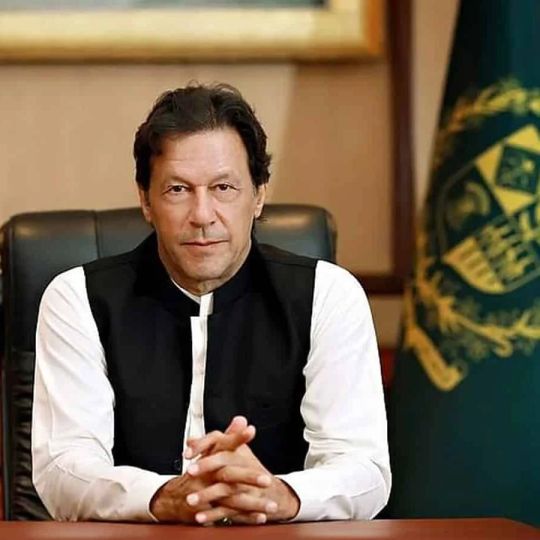
. "ONE MAN ARMY" - IMRAN KHAN "The Real Man. The Real Hero. The Real Human." . THIS IS IT NOW OR NEVER . This man, Imran Khan (X-Prime Ministerof Pakistan), is the ONLY man who stood against the current mofokrs sh!tfaces people in government in Pakistan. READ ABOUT HIM. You'll know what I'm talking about. The current government in Pakistan, tried to assassinate him lately; shot 4 bullets on his left leg; raided and ruined his house without any warrant; alleged him of 100 cases and he's still in the country and facing them all with all his courage. The whole nation is now awaken and being with him all across the globe. Just because he's fighting and standing for rights of his nation. This is what happens in this F up planet when someone stands for the right and speaks out. He/she either gets assassinated or gets in jail. . Write your comments on it. . #imrankhan #myleader #weloveyou #ourleader #iloveyou #pakistan #pakistanleader #future #war #against #importedgoverment#motherfuckers #shitfaces #thisiit #itsnowornever #voteforimrankhan #vote #mudassarjackson #mudassarjacksonofficial . @ptiofficial @imrankhan.pti (at Pakistan) https://www.instagram.com/p/Cp9lXVZoRs_3TLc4JHvIB8rYSpwSHixJ__CwIA0/?igshid=NGJjMDIxMWI=
#imrankhan#myleader#weloveyou#ourleader#iloveyou#pakistan#pakistanleader#future#war#against#importedgoverment#motherfuckers#shitfaces#thisiit#itsnowornever#voteforimrankhan#vote#mudassarjackson#mudassarjacksonofficial
0 notes
Photo




ONE VOTE FOR THIS AGE OF ANXIETY
MARGARET MEAD
#ONE VOTE FOR THIS AGE OF ANXIETY MARGARET MEAD#ONE VOTE FOR THIS AGE OF ANXIETY by MARGARET MEAD#ONE VOTE FOR THIS AGE OF ANXIETY#Margaret Mead#ANXIETY#A Selection of Modern English Prose#ENGLISH PROSE#Prose#Compiled and Edited by Prof. SAJJAD SHAIKH#Prof. SAJJAD SHAIKH#SAJJAD SHAIKH#for B.A. CLASSES#POLYMER PUBLICATIONS URDU BAZAR LAHORE#POLYMER PUBLICATIONS#URDU BAZAR LAHORE#URDU BAZAR#Lahore#Pakistan
0 notes